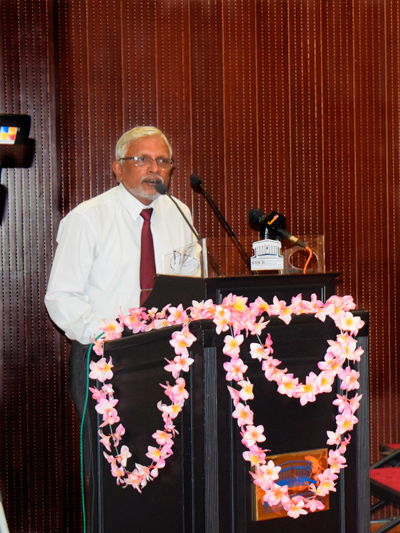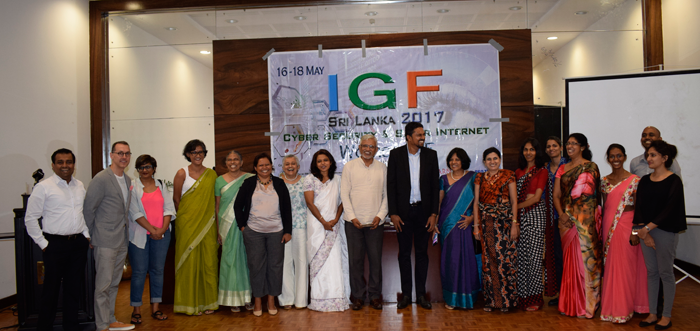The Internet Society – Sri Lanka Chapter hosted its second annual national Internet Governance Forum (IGF) in the capital of Colombo from May 16-18. This year’s theme was “Cyber Security & Safer Internet.” Among the participants were leading Sri Lankan academics, government officials, private sector representatives, and those advocating for greater internet access for women and people with disabilities.

Sri Lankan Secretary to the Ministry of Telecommunication and Digital Infrastructure, Mr. Wasantha Deshapriya, speaking at IGF.
The Forum was also attended by Mr. Wasantha Deshapriya, Sri Lankan Secretary to the Ministry of Telecommunication and Digital Infrastructure, who called for improved measures allowing for citizens to access government services, apply for permits, and pay taxes online, for example. He also welcomed the “watchdog” role that civil society plays in ensuring such measures are appropriately developed and implemented.
Counterpart International was invited to participate as a presenter on the topic, “Digital Rights and Multistakeholderism,” which addressed some of the major human rights issues online and the importance of the multistakeholder model of internet governance. The three-day event also included the School of Internet Governance, the Women’s Internet Governance Forum, and the Youth Forum. Throughout the Forum, discussions repeatedly came back to the theme that issues and concerns around the internet mirror the issues faced in the offline world as well. Women and youth are more vulnerable both online and off, for instance, and the tools and techniques needed to combat these challenges need to be taught widely now more than ever.
During the Women’s Forum – the first ever in Sri Lanka – many participants spoke of the need for a greater understanding of how cultural dynamics shape women’s access to and negotiation of online spaces. Women and girls experience barriers online more profoundly than men, particularly where there are strong legacies of sexism and patriarchy. One speaker noted that while access to the internet is spreading in the region, women still lag behind men in the digital divide, access to technology and leadership roles, and the professional skills necessary to develop their own content.

The Women’s Internet Governance Forum and Mr. Wasantha Deshapriya, Sri Lankan Secretary to the Ministry of Telecommunication and Digital Infrastructure, at the May 2017 event.
Women’s and girls’ empowerment online is a component of the UN’s Sustainable Development Goals for 2030 as well, specifically to “enhance the use of enabling technology, in particular information and communications technology, to promote the empowerment of women.”
Overarching topics of discussion at the Forum included the basic technical infrastructure of the internet, how it works, how networks and web pages communicate with one another, and the future of expanding technical capacity nationwide. Participating students and youth were particularly interested in the discussions on basic safety techniques related to data shared online, harassment on social media, disability access, and the politics of how internet policy is made and managed. The Forum is an important venue for understanding and addressing issues online that can mirror issues that youth and other vulnerable populations have experienced in real life as well.
Take education, for example. With many young Sri Lankans online and communicating through social media platforms, there is a need to ensure the same safety measures offline are taken into consideration online, most notably media literacy around the consumption of fake news, sharing personal data online, cyberbullying, and negotiating healthy relationships. A representative from civil society raised the need for the public education system to prioritize basic online literacy, safe usage, and community building as part of the standard curriculum for students, similar to math and science.
The internet builds communities, empowers individuals, and provides educational opportunities. It can also exacerbate and mirror offline social problems such as bullying and sexual harassment. The Internet Governance Forum is a valuable forum to combat these challenges, and Counterpart’s Internet Governance and Internet Freedom team is excited to be a part of this important conversation.
Check out video highlights of the major panel discussions.
The Internet Governance Forum – Sri Lanka is part of an informal network of state, regional, and international Forums under the United Nations. Counterpart International attended this event as part of our Internet Governance and Internet Freedom Program. The Forums serve as venues to address how the internet is governed and to ensure it remains free, open, and accessible to all. Although it has no formal legal authority, the IGF was founded on the principle of the multi-stakeholder governance model, adopted at the UN World Summit on the Information Society in 2005, convening government representatives, the technical community, academia, and civil society to discuss, debate, and build consensus around internet policy, access, technical standards, and online rights, among others.


